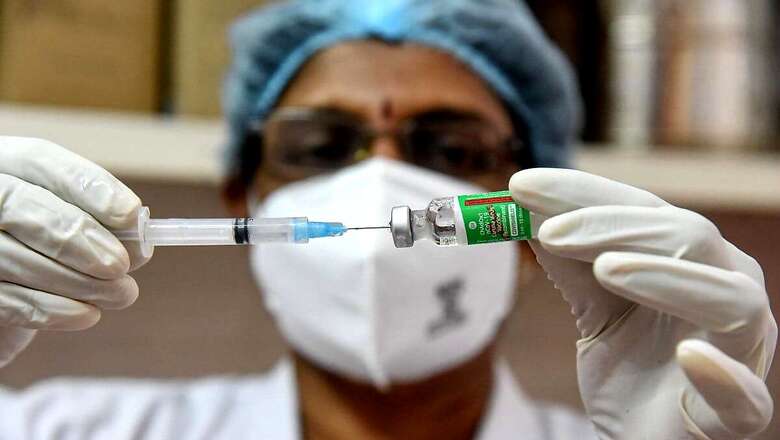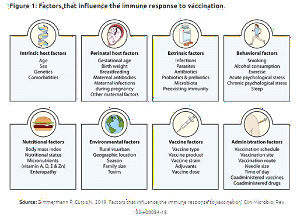
views
The COVID-19 pandemic has brought uncertainties and challenges to keep ourselves and our families protected and healthy, both physically and mentally. As the vaccine drive is being rolled out, policy makers should focus on initiatives that can improve the efficacy of the vaccine for the common man. Multiple studies indicate that nutrition provides a cost-effective yet significant impact on vaccination outcomes, and can, therefore, improve vaccine efficacy.
It has been seen that immunocompromised individuals with underlying conditions of non-communicable diseases have been more prone to and are at risk from COVID-19. A study conducted on the efficacy of vaccines on obese people indicates poor response to vaccines in obese individuals, putting them at risk of vaccine-preventable diseases. On the other hand, malnutrition-induced immunodeficiency is known to reduce effective response to vaccines. Both undernutrition and obesity threaten to drive increased mortality during the COVID-19 pandemic and, in the long-term, they both potentially undermine the efficacy of new vaccines. The Novel Coronavirus, while being genetically similar to SAR-CoV, is a new strain and has no underlying natural immunity against it.
Lifestyle changes and increased consumption of ultra-processed food have led to an obesity epidemic leading to a rise in conditions like diabetes and hypertension. Non-communicable diseases (NCDs) account for about 70 per cent of all deaths worldwide. The pandemic has impacted the ability to address NCDs with the disruption it brought to health services in countries across the world. A rapid survey of 163 countries by the World Health Organisation reported a considerable degree of disruption to NCD services due to the COVID-19 pandemic in 75 per cent of the countries surveyed. Cancellation of elective care, lack of transportation due to lockdown, insufficient manpower to tackle the overwhelming number of cases and closure of hospital services were some of the cited reasons. Along with other risk factors—unhealthy diet, alcohol use, lack of physical activity and stress—it further puts people with NCDs at risk.
ALSO READ| Isolating Risky Pockets, Identifying Vulnerable Groups: How Mumbai Can Tackle Covid-19 Surge
A recent review on vaccine studies by Ohio State University indicates stress, depression and unhealthy behaviour to impact immune response to vaccines and this effect may be greatest in vulnerable groups like the elderly. The research suggests psychological and behavioural interventions in improving vaccine efficacy and reducing side effects.

The figure above clearly indicates the various factors that influence immune response to vaccination. Among others, it is evident that nutritional factors have an intrinsic role to play on the individual’s response to vaccines. According to Prof. Srinath Reddy, “A vaccine only provides the antigenic stimulus and how the body reacts is influenced by the nutritional status and will vary among individuals”.
Healthy eating helps build the immune system, and conversely, lack of a healthy diet can lead to weakening of both the innate and acquired immunity, making one susceptible to infections. However, it is possible to reverse and strengthen the immune system by correcting nutrition deficiency. The guidance on the requirements for health related to the immune system has recognised certain vitamins and trace elements such as zinc, iron, selenium and copper for their role in the functioning of the immune system. A review of micronutrients and their impact on the immune system suggests the role of vitamins C and D and zinc in strengthening immune support and reducing risk of infections. Thus, consuming a nutrient-rich diet is prudent to support the immune system and deal with pathogens.
Quoting Hippocrates, “Let food be thy medicine and medicine be thy food.”
It is known that nutrient intake and incidence of the disease impact the nutritional status of individuals and a lack of it can lead to severe malnutrition. Malnutrition can affect the quality of immune response to vaccination, especially in vulnerable populations affected by the hunger pandemic. A balanced and healthy diet can ensure a robust immune system and lower incidence of chronic diseases and infections.
ALSO READ| As Covid-19 Ravages Maharashtra, Why Do We Not Fear it Enough to Stay safe?
As the world regroups and regrows after a devastating year, it has become increasingly important to have a nutrition rich intake of food to reduce the long-term complications from COVID-19. Studies indicate better response to vaccines and antibody stores in the elderly who consumed five or more servings of fruits and vegetables and/or Vitamin E supplements. Polyphenols are micronutrients naturally occurring in plants and act as dietary antioxidants. A review suggests long-term consumption of polyphenols offer protection against cardiovascular diseases and diabetes due to its anti-inflammatory properties.
Another study elicits the role of zinc and selenium in immunomodulatory effects in the management of COVID-19. A review done on the impact of vitamin D on responses to the influenza vaccine indicates a low response to vaccinations for respiratory infection in individuals deficient in Vitamin D. A rapid review on vitamin D and COVID-19 suggests a possible role in the body’s immune response to respiratory viruses.
Experts suggest improving lifestyle and consuming diets rich in nutrients to improve immune responses. What is of utmost importance is providing information on COVID-19 vaccines along with counselling on good nutrition for improved vaccine response and efficacy.
This article was first published on ORF.
Read all the Latest News, Breaking News and Coronavirus News here


















Comments
0 comment